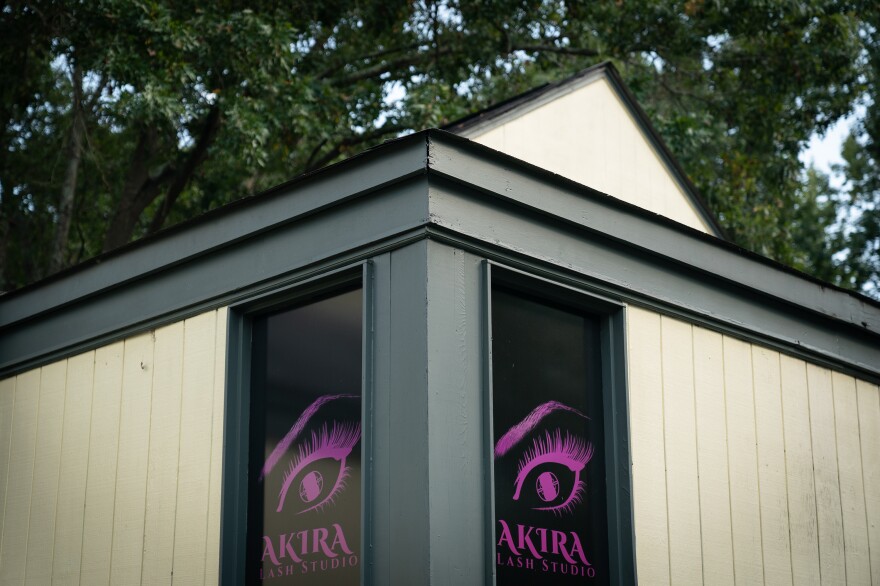Akira Johnson lives in Columbia, S.C., with her three kids. She tries to make the place joyful for them with flowers and pillows that say things like "happy" and "sunshine."
She has decorated one wall with the logo of her small business: an eye with amazing eyelashes.
"I'm a licensed cosmetologist," Johnson says. "I specialize in eyelash extensions. It takes about two hours."
Johnson says that she used to make about $60,000 a year with her eyelash business. But when the coronavirus pandemic hit, she was forced to shut down her salon. She did everything she could to keep paying rent. She downsized to a cheaper apartment, applied for unemployment benefits and emptied her savings. But eventually, she fell behind.

Johnson applied for rental assistance money. But she has been waiting for months. She's not alone.
Nationally, a race is underway to help people behind on rent and facing eviction. Congress has approved a historic $47 billion in emergency rental assistance, but the vast majority of that money has not reached the millions of people who desperately need it.
"They make it sound so, 'We're here to help,' " says Johnson. "But the process doesn't translate to that."
To understand why, you need to start at the moment all this money was created, nearly 10 months ago. You might call it "Help Is on the Way Day."
"We can finally report what our nation has needed to hear for a very long time," Sen. Mitch McConnell, R-Ky., said back on Dec. 20. "More help is on the way."
This was the day Congress finally reached a deal on one of those big pandemic relief bills, setting aside billions of dollars for rental assistance. Sen. Chuck Schumer, D-N.Y., gave his own speech. "To people who might have been evicted from their homes," he said, "help is on the way."
Schumer said that phrase six times.
Earlier in the pandemic, the federal government got money to Americans very quickly with those relief checks. But that was easy: For the most part, the IRS had everyone's information. So the Treasury Department basically just hit "Reply All" on our tax filings.
But with rental assistance, there is no "Reply All" button.

Local governments have a much better idea of what's happening on the ground — who is behind on rent and facing eviction. Eviction cases are usually filed in county courts.
"It's easier for you to show up to a local office to talk about the need for rental assistance," says Wally Adeyemo, the deputy U.S. Treasury secretary. And so Congress told the Treasury to send all this money down to the states, counties and cities to distribute it.
This led to the first big logjam. Around the U.S., 500 different rental assistance programs had to get up and running. In South Carolina, that took 135 days after the "help is on the way" speeches.
By then, Akira Johnson was starting to fall behind on rent, so she applied for the help.

"They wanted you to upload your documents, so basically your income, electric bill, ID ... lease," she says.
This is logjam No. 2: documentation requirements. Showing that you have a lease might sound simple. But these programs discovered that often it's not.
"A lot of people in South Carolina have very informal lease arrangements," says Chris Winston of SC Housing, South Carolina's housing agency.
"People rent from Jimmy this house or this mobile home on some land, and there's no signed agreements," says Winston.
Another example: providing proof you lost your job. Say you worked at a restaurant and it shut down during the pandemic and you can't reach the owner.
"Proving that you're not doing something or that something's not happening has proven to be a challenge," says Winston.
A month into South Carolina's program, Winston says, the program had handed out money to only about 10 families.
"That's when we realized how many applications were being held up because of documentation requirements," he says.

This is a classic trade-off for government programs: basically, a dial that programs can turn. One end is getting the money out fast, and the other is going slowly and requiring lots of documents, which helps reduce fraud.
So the federal government started issuing guidance to the state programs, saying basically that this is an emergency and we want you to turn the dial toward the faster speed so people get the money before they are evicted.
One big part of that involves what's known as self-attestation, or allowing people to simply check a box saying "I swear this is true" instead of requiring them to upload a pile of documents.
About 180 days after those "help is on the way" speeches, South Carolina did that and more money started flowing. Meanwhile, things were getting serious for Johnson.
"They filed an eviction on me," Johnson says. "They knocked on my door with the eviction paper."
The state was willing to pay Johnson's $6,200 in back rent, but Johnson was running into the third major logjam for rental assistance.
Under the rules of most of these state and local programs, the check has to be written to the landlord. Many landlords do cooperate with rental assistance programs.
But Johnson's landlord, a company called DLH Properties, refused to provide a document that the South Carolina program was asking for. It was a standard form called a W-9 that is used for reporting payments for tax purposes. But in a court recording, a representative of the company said, "The owner does not take any assistance from anywhere that's requesting a W-9."

DLH Properties didn't respond to repeated requests for an interview, so its reasoning behind that is unclear. Several experts NPR interviewed said there isn't any clear business reason why providing a W-9 should be a problem. The company owns 28 rental complexes across five states.
But this meant that Johnson couldn't get the emergency rent money and the landlord was pushing ahead to evict her.
"I still don't know why they won't accept the money," Johnson says. "You've got families that you rather see on the street — that didn't make sense to me."
NPR spoke to Johnson when, after months of trying to get this help, she had an eviction hearing coming up in just four days. And she was scared.
"I feel like if we did lose the place, I would probably have to send my kids to their grandparents. That's like separating from them," Johnson said, choking back tears.
"I would probably rather go to a shelter where we can all be together, you know what I mean?" she said. "That's probably the hardest part, just thinking about being separated from them."

At that moment, it had been 263 days since the "help is on the way" speeches. And around the country, people have lost their homes because of these delays in rental assistance money.
But to deal with the landlord problem, a handful of programs have started to cut checks directly to tenants. The Treasury Department has been urging programs to do this. And just recently, South Carolina started sending checks directly to renters too.
Just days ago, 283 days after the help speeches, Johnson finally got a check in her own name. She spoke to NPR as she opened the envelope. "That's it!" she said, celebrating with laughter as she held the check in her hand. "It's a relief," she says. "I'm just ready to go forward."
Johnson says her landlord accepted the back-rent payment. And it looks like she and her family are going to be OK. If she requires more rental assistance as she tries to get her business back up to its normal level of income, she should qualify for more help.
Nationally, the emergency rental assistance programs are reaching more people now. The Treasury Department says about 1.5 million payments have gone out to people so far. But many times that number of people still need this help. More than 8 million Americans are still behind on their rent — twice as many as in normal times.
To try to speed things up further, Adeyemo says the Treasury Department is going to start taking money away from programs that aren't getting the money out the door.
"We want to reallocate money away from states and local programs that aren't using the money, because they either don't have as many evictions as other states and cities," he says, "or because they don't have the will to actually set up programs that are working."
Copyright 2021 NPR. To see more, visit https://www.npr.org.





